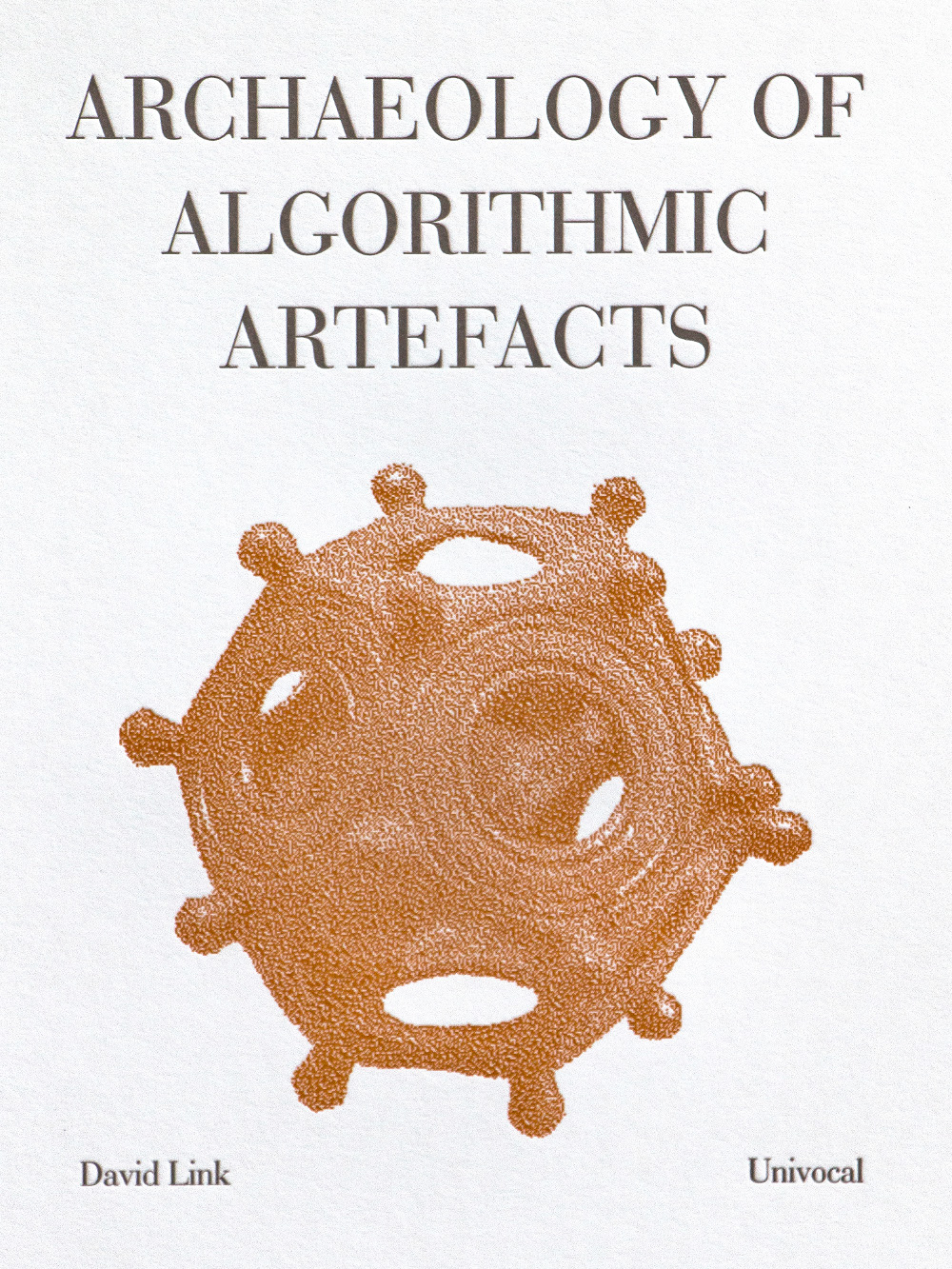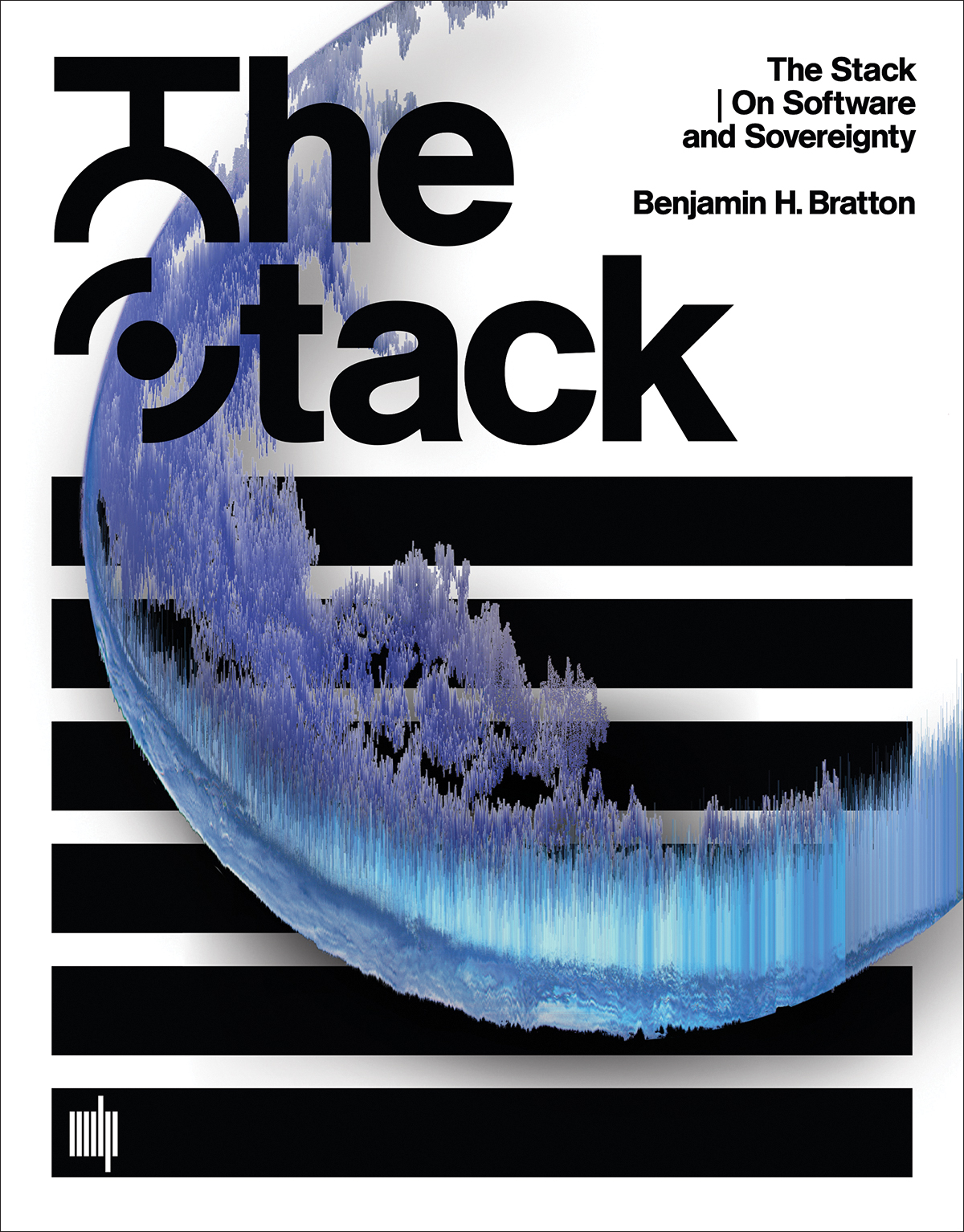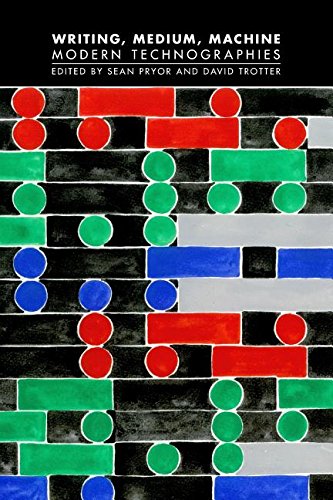David Link: Archaeology of Algorithmic Artefacts (2016)
Filed under book | Tags: · algorithm, apparatus, computing, history of computing, machine, mathematics, media archeology, theory

“Unearthing the cumulus of transient technologies that underlie the fabric of contemporary society
As historical processes increasingly become steeped in technology, it becomes more and more necessary for a discipline to emerge that is capable of comprehending these materialities beyond their shelf life to better understand the fields they inundate such as science, art, and warfare. This effort is further compromised by the inherent complexity and complete arbitrariness of technical languages – especially when they are algorithmic – along with the rapid pace in which they become obsolete, unintelligible, or simply forgotten. The Turing Machine plays a central role in the Archaeology of Algorithmic Artefacts, wherein the gradual developments of the individual components encompassed by this complex technology are placed within the context of engineering sciences and the history of inventions. This genealogy also traces the origin of the computer in disciplines such as mathematics, meta-mathematics, combinatorics, cryptology, philosophy, and physics. The investigations reveal that the history of apparatuses that process signs is in no way limited, as one might think, to the second half of the 20th century, rather it is possible that they existed at all times and in all cultures.”
Publisher Univocal Publishing, Minneapolis, 2016
ISBN 9781937561048, 1937561046
207 pages
Review: Lisa Gitelman (Computational Culture, 2017).
PDF (18 MB)
Comments (3)Benjamin H. Bratton: The Stack: On Software and Sovereignty (2016)
Filed under book | Tags: · architecture, automation, city, cloud computing, computation, earth, geopolitics, infrastructure, interface, internet of things, software, software studies, technology, theory

“What has planetary-scale computation done to our geopolitical realities? It takes different forms at different scales—from energy and mineral sourcing and subterranean cloud infrastructure to urban software and massive universal addressing systems; from interfaces drawn by the augmentation of the hand and eye to users identified by self—quantification and the arrival of legions of sensors, algorithms, and robots. Together, how do these distort and deform modern political geographies and produce new territories in their own image?
In The Stack, Benjamin Bratton proposes that these different genres of computation—smart grids, cloud platforms, mobile apps, smart cities, the Internet of Things, automation—can be seen not as so many species evolving on their own, but as forming a coherent whole: an accidental megastructure called The Stack that is both a computational apparatus and a new governing architecture. We are inside The Stack and it is inside of us.
In an account that is both theoretical and technical, drawing on political philosophy, architectural theory, and software studies, Bratton explores six layers of The Stack: Earth, Cloud, City, Address, Interface, User. Each is mapped on its own terms and understood as a component within the larger whole built from hard and soft systems intermingling—not only computational forms but also social, human, and physical forces. This model, informed by the logic of the multilayered structure of protocol “stacks,” in which network technologies operate within a modular and vertical order, offers a comprehensive image of our emerging infrastructure and a platform for its ongoing reinvention.
The Stack is an interdisciplinary design brief for a new geopolitics that works with and for planetary-scale computation. Interweaving the continental, urban, and perceptual scales, it shows how we can better build, dwell within, communicate with, and govern our worlds.”
Publisher MIT Press, 2016
Software Studies series
ISBN 9780262029575, 026202957X
xx+502 pages
Reviews: Mercedes Bunz (Media Culture Society, 2016), Roger Whitson (2016), Marc Tuters (Computational Culture, 2017).
Commentary: McKenzie Wark (Public Seminar, 2016), Lukáš Likavčan (Hong Kong Review of Books, 2017; Artalk, CZ).
Sean Pryor, David Trotter (eds.): Writing, Medium, Machine: Modern Technographies (2016)
Filed under book | Tags: · literature, machine, media, media archeology, media technology, technology, theory, writing

“This is a collection of thirteen scholarly essays which explores the mutual determination of forms of writing and forms of technology in modern literature. The essays unfold from a variety of historical and theoretical perspectives the proposition that literature is not less but more mechanical than other forms of writing: a transfigurative ideal machine. The collection unearths representations in literature and film of a whole range of decisive technologies from the stereopticon through census-and slot-machines to the stock ticker, and from the Telex to the manipulation of genetic code and the screens which increasingly mediate our access to the world and to each other. It also investigates concepts which articulate the relation between writing and technology: number, measure, encoding, encryption, the archive, the interface.”
Contributors: Ruth Abbott, John Attridge, Kasia Boddy, Mark Byron, Beci Carver, Steven Connor, Esther Leslie, Robbie Moore, Julian Murphet, James Purdon, Sean Pryor, Paul Sheehan, Kristen Treen.
Publisher Open Humanities Press, 2016
Technographies series
Creative Commons BY-SA 4.0 License
ISBN 9781785420061
223 pages
PDF (updated on 2016-11-12, with bookmarks, metadata and compressed, via Malcolm Dean, 2 MB)
PDF (from publisher, 3 MB)

